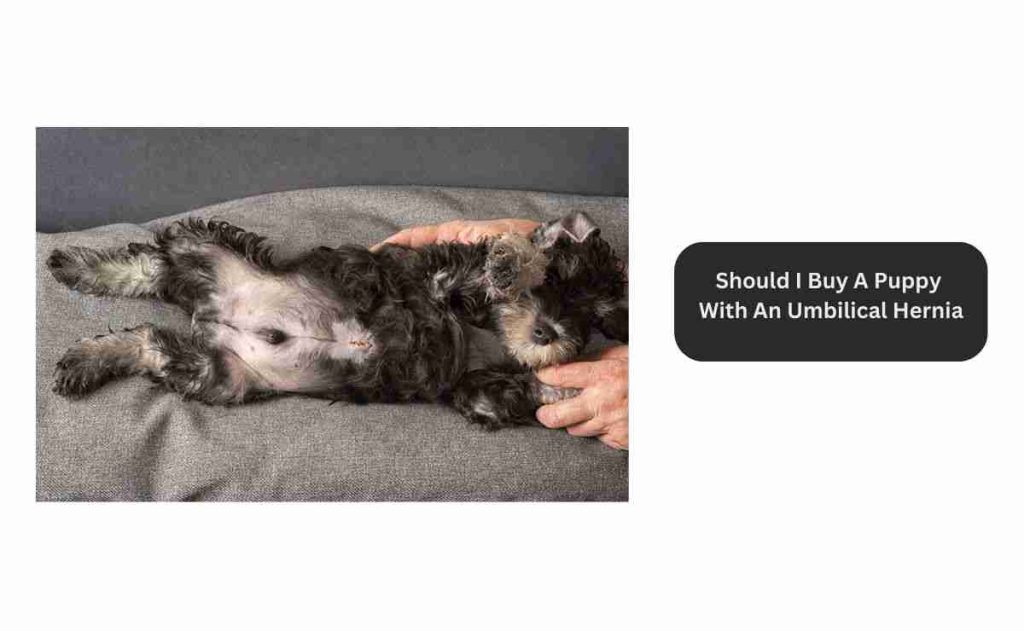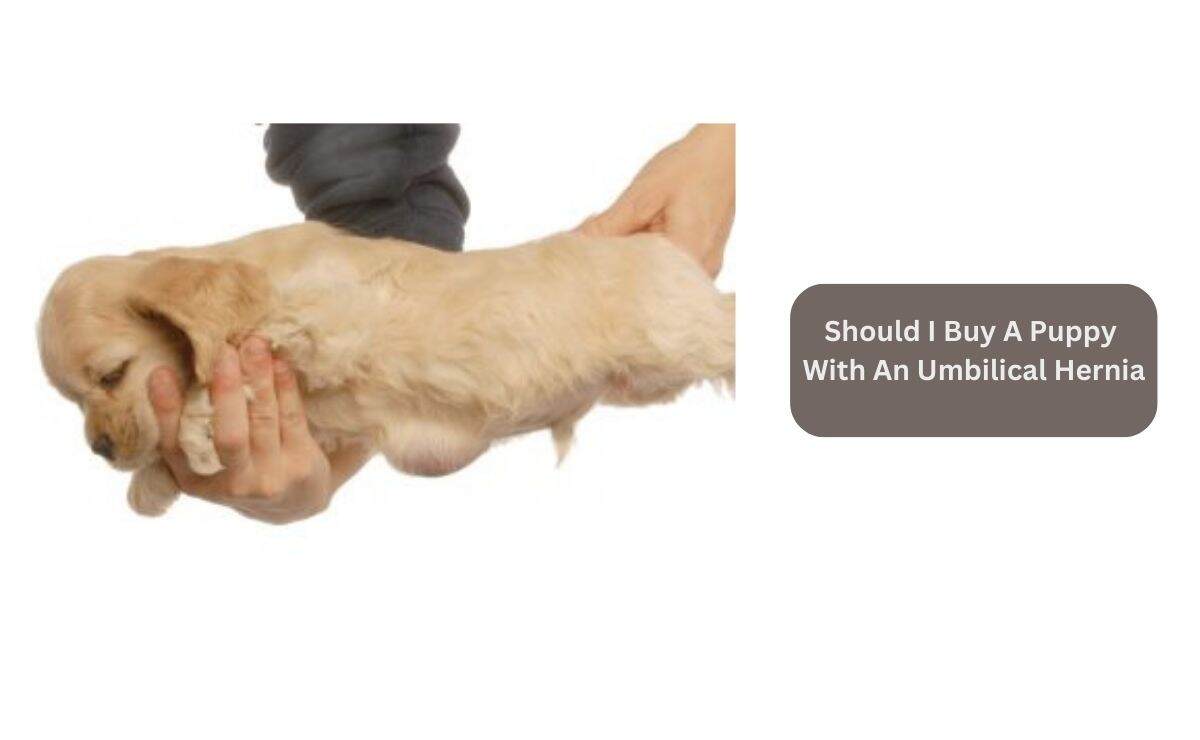It’s a welcoming decision to get a puppy into your home. It’s exciting for you, but it is crucial to pay attention to their health condition before buying. However, what if your beloved puppy comes across with an umbilical hernia?
In this situation, you may wonder: should I buy a puppy with an umbilical hernia?
An umbilical hernia is a quite common condition and doesn’t demonstrate much risk to a puppy. It can be treated and removed easily. Still, I’ll enlighten you on the pros and cons of buying a puppy with an umbilical hernia so that you can make a worthwhile decision.
What Is Umbilical Hernia?
Umbilical hernias occur near the belly button (umbilicus) in the abdominal wall. You can see a bulge on the puppy’s abdominal contents. It may contain fat or even a bit of intestine.
The occurrence of umbilical hernias in puppies is not uncommon. 90% of hernia in puppies is due to genetics. It’s stemming from the puppy’s development in the womb. So, if your dog has a hernia, there is a high chance its offspring will too.
Puppy umbilical cords pass through small openings in abdominal muscles after birth. This opening usually closes after birth. But in some cases, it doesn’t seal completely, leading to an umbilical hernia.
Should I Buy A Puppy With An Umbilical Hernia?

A puppy can have various types of hernia, but umbilical hernia is the most common one, which is a harmless birth defect. It can recover on its own or you can deal with it through a minor surgery.
However, if you are going to buy a new puppy with an umbilical hernia, then it’s a matter of consideration. Actually, the size of the hernia matters in this situation. Simply, if the puppy has a small hernia, it doesn’t matter of worry. It should be fine and resolved naturally.
But if the puppy has a relatively larger hernia, then you should consider it twice. Because gradually, the bulge grows and causes a severe issue. It becomes a distress for the puppy, or they feel pain when touched. At the end of the day, you will require money and effort to nurture the pet with a larger umbilical hernia.
So, if you don’t want to increase your financial burden, then you should avoid a puppy with a large umbilical hernia. Small-sized hernia shouldn’t be so serious, so you can buy a puppy with it.
Symptoms of Umbilical Hernia
There are a few symptoms of umbilical hernia that you should check before buying a puppy.
- Begin by gently laying your puppy on its back. Take a close look at its belly, specifically around the belly button area.
- If there is any bulge near the belly button, it is an umbilical hernia. Measure the size of the opening. If it’s no larger than the tip of your pinky finger, there might not be much to worry about. However, if the opening appears larger, it is definitely a reason for concern.
- If your puppy seems to shy away or flinch when you touch its belly, it could be a sign of discomfort caused by an umbilical hernia.
- Pay attention if your puppy stands in a stiff manner with its back arched. This posture could be an indicator of discomfort due to a hernia.
- A significant hernia might lead to a reduction in appetite or even a complete loss of interest in food.
- Keep an eye out for signs of nausea and vomiting, which could be linked to an umbilical hernia.
How serious is an umbilical hernia in a puppy?
An umbilical hernia is often a common defect and doesn’t require medical attention. Whether your puppy requires medical treatment or not depends on the size of the puppy’s hernia. A larger size of hernia means a degree of severity, and you must pay very close attention to it. You should take your puppy to the veterinarian for a checkup.
If the hernia is larger, you can remove it through a surgical procedure. If the bulge is getting smaller, causing no discomfort or pain, you should reject the surgery.
Some tissues (such as intestines or other organs) may become trapped and strangle themselves (blood is cut off to the tissue, causing its death). In such extreme cases, you should take care of your puppy and take it to the vet regularly for check-ups. Also, it needs emergency surgery.
When Should I Treat My Puppy’s Umbilical Hernia?
As a caring pet owner, it’s natural to wonder when the right time is to address your puppy’s umbilical hernia. Firstly, you should observe the size of hernia. Smaller hernias, especially if they don’t cause discomfort or allow organs to protrude, might not require immediate treatment. However, if the hernia is larger or if organs become trapped, you should start immediate treatment.
In some cases, small umbilical hernias in puppies close on their own as the puppy grows. Depending on your puppy’s age and the condition of the hernia, your vet can advise on whether a “wait and watch” approach is appropriate or not.
If you have plans to breed your puppy in the future, you should go for treatment as its breed will have the same defect. You should consult a veterinarian and experienced breeders to get help in this case.
Surgery For Umbilical Hernia in Puppies
A common recommendation from veterinarians is to opt for surgical intervention when dealing with umbilical hernias in puppies. Often, this surgery is conveniently performed at the same time as neutering.
By combining these two procedures, your puppy experiences anesthesia and recovery only once, which is not only more convenient but also cost-effective for you as a pet owner.
However, it’s important to note that if your puppy’s intestines become trapped within the hernia. And it requires immediate surgery to prevent further complications.
The surgical process itself is relatively minor. During the procedure, the vet removes the scar tissue surrounding the hernia site and carefully closes the opening. The cost for this umbilical hernia surgery typically averages around $200.
While the surgery is straightforward, it’s still a surgical procedure involving anesthetics and incisions. Hence, it’s advised to opt for this procedure only when it’s truly necessary for your puppy’s well-being.
Alternative Options To Treat Umbilical Hernia
In some cases, if you do not want to get your puppy surgery due to the potential risks, you can deal with alternative options. Some use of a belly wrap to reduce the puppy’s hernia.
The concept behind this method is to prevent your puppy’s internal tissues from protruding through the hernia opening. Essentially, the wrap acts as a support to keep things in place. It allows the hernia to potentially heal on its own.
Though this alternative treatment has shown positive outcomes in certain instances, there’s no guarantee of success. As a responsible puppy parent, the choice between surgical intervention and alternative methods should be made with careful consideration.
Frequently Asked Questions (FAQs)
Does an Umbilical Hernia Hurt a Puppy?
Whether umbilical hernia causes pain or not can vary. Generally, small hernias tend to be not painful. Your puppy might not even show signs of discomfort. However, larger hernias, especially those where organs become trapped, can indeed cause pain and discomfort.
Can You Breed a Dog With an Umbilical Hernia?
Yes, they can, but it is not recommended. Breeding a dog with this condition can potentially pass on a genetic predisposition to hernias. which might not be in the best interest of the breed’s health.
Conclusion
As you read through the whole post, you must understand that an umbilical hernia is not a big issue unless it is small in size. You can buy your puppy with it. But a bigger hernia is a sign of concern.
Remember, your priority is your puppy’s health and comfort. So, with this guidance, you can make an informed decision.
